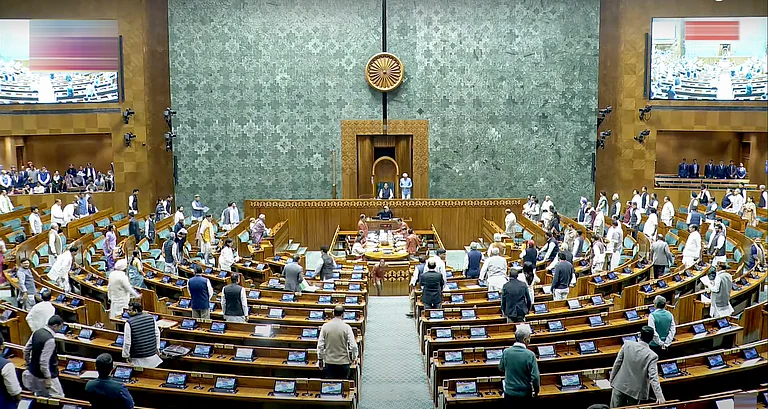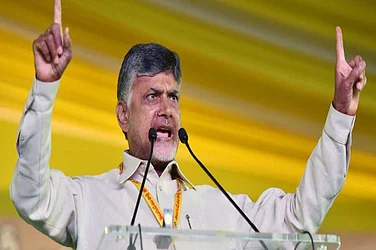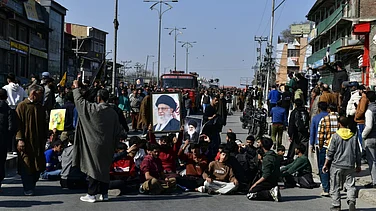The 31 recognised political parties received as much as 55.90 per cent of their political funds through electoral bonds during 2016-22, according to the electoral watchdog Association for Democratic Reforms (ADR).
The 31 parties, including seven national and 24 regional parties, received a total of Rs 16,437.63 crore in funds. Of these funds, the Bharatiya Janata Party's (BJP) own declarations show that its funds were more than three times of the funds of all other parties combined.
For the year 2022-23, audit reports of only 29 parties' audit statements are available on the Election Commission of India's (ECI) website, according to the website. The data for 2023-24 is not yet available. This means that the data for 2022-23 and 2023-24 is not yet complete.
The law states that all political parties have to file a contribution report with the Election Commission of India (ECI) every year in which they have to disclose all the funds received by them which were above Rs 20,000. The funds received through electoral bonds are, however, exempt from any disclosure. After Thursday's Supreme Court ruling, however, in which it struck down the bond scheme and held it as unconstitutional, the details of finances from bonds has to be furnished by March 13.
The ADR report, titled 'Analysis of Donations to Registered Recognised Political Parties, FY 2016-17 to FY 2021-22', also shows that while the BJP comes first both in terms of overall funds and funds received through electoral bonds in value, Congress and the Trinamool Congress (TMC) have a much higher share of funds received through electoral bonds.
"During the six-year period, more than 52 per cent of BJP’s total donations came from electoral bonds worth Rs 5271.9751 cr, while all other national parties amassed Rs 1,783.9331 cr. INC declared the second highest donations from bonds of Rs 952.2955 cr (61.54 per cent of its total donations) followed by AITC which declared Rs 767.8876 cr (93.27 per cent)," says the ADR report.
Critics of the electoral bonds and the amendments that accompanied the introduction of such bonds say they have brought opacity to political funding. In addition to electoral bonds being exempt from disclosures in the annual reports to the ECI, the accompanying amendments also removed the cap on the corporate donations to parties and also paved the way for donations from abroad.
Indian political funding in numbers
Seven national and 24 regional political parties received a total of Rs 16,437.63 crore in political donations during 2016-22, according to the ADR report.
These donations have been classified into three categories:
1. Electoral bonds
2. Direct corporate donations
3. Other donations (including below Rs 20,000)
As per the current laws, parties are not required to disclose donations under Rs 20,000 or donations above Rs 20,000 through electoral bonds.
Of the Rs 16,437.63 crore that these 31 parties got during 2016-22, ADR published the following break-up:
1. Rs 9,188.35 cr through electoral bonds (55.90 per cent)
2. Rs 4,614.53 cr through corporate sector (28.07 per cent)
3. Rs 2,634.74 cr under Rs 20,000 (16.03 per cent)
The Bharatiya Janata Party (BJP) emerged as the biggest receiver of donations, both in terms of electoral bonds and corporate funds.
"The total donations declared by BJP is more than three times the total donations declared by all other National parties...The corporate donations declared by the BJP are at least three-four times more than the total corporate donations of all other national parties. In FY 2017-18, it was more than 18 times that of all other national parties," noted the ADR report.
In terms of the share of electoral bonds in their overall donations, several parties outdo the BJP, including the Congress party which has termed the scheme a tool to convert black money into white money.
"BJP unleashed the electoral bonds scheme to legitimise its loot through 'crony capitalism'. Destroying democracy, discarding transparency, and demolishing electoral practises is the sole objective of the (Narendra) Modi government. This effectively implies that the Modi government's controversial, corrupt, and contrived electoral bonds scheme is a 'money whitening' scheme that converts 'black money' to white," said Congress leader Pawan Khera in July, as per UNI.
The ADR report said that while the BJP received its 52 per cent donations through electoral bonds, the percentage for Congress despite such harsh words of criticism was 61.54 and the share of electoral bonds in TMC's funds was 93.27 per cent.
In the period 2016-22, the ADR report lists the total donations received by the seven national parties as follows:
1. BJP : Rs 10,122 crore
2. Cong : Rs 1,547 crore
3. TMC : Rs 823 crore
4. CPI(M) : Rs 367 crore
5. NCP : Rs 231 crore
6. BSP : Rs 85 crore
7. CPI. : Rs 13 crore
Political Funds For 2022-23
In the year 2022-23, the latest year for which data is available, 17 parties received a total of Rs Rs 2795.2569 crore in funds through electoral bonds, according to data collated by ADR through audit reports.
Of all the funds that the parties drew from electoral funds, the Bharatiya Janata Party (BJP) came first with a share of around 46 per cent.
The BJP, which drew Rs 1294.1499 crore from electoral bonds, was followed by Bharath Rashtra Samithi (BRS) which drew Rs 529.037 crore, Trinamool Congress (TMC) drew around Rs 325.10 crore, and Congress drew around 171.02 crore, according to ADR.
ECI flagged opacity, media reports found bonds traceable
The Election Commission of India (ECI) had informed the Centre in 2017 that the electoral bonds would have "serious repercussions" on the transparency aspects of political funding and financing of political parties in India, according to an affidavit filed in the Supreme Court in 2019.
The ECI had also flagged the Centre's nod to foreign funding to Indian parties. Indian parties can now take funds from foreign entities as long as they follow the Foreign Exchange Management Act (FEMA) rules. All foreign funds were previously banned.
"This is a change from the existing law barred donations from all foreign sources as defined under the Foreign Contribution Regulation Act. This would allow unchecked foreign funding of political parties in India which could lead to Indian policies being influenced by foreign companies," said the ECI to the Centre in 2017, according to a copy of the affidavit published by SC Observer.
Moreover, it has also been highlighted that while the Centre has hailed electoral bonds as a secure and private way to fund parties, it has been pointed out that only the general public is unaware of the donations. The government can still access who donated how much to which party.
Citing government documents accessed through the Right to Information Act (RTI) Act, HuffPost India reported in 2019 that there exists an alphanumeric code on the bonds that can be used to trace the donations. The presence of such a code was also reported by The Quint and the Centre had responded by saying that such a code existed to assign uniqueness to a bond to prevent forgery. Such codes, said the Centre's response, were not noted anywhere and were not shared with anyone.
HuffPost, however, reported that the State Bank of India (SBI), the only bank which issues bonds, uses codes to keep track of who bought how many bonds, and the political party to whom the bond was eventually donated.
"This mechanism of tracking these bonds, the documents reveal, was approved by the Finance Ministry. The rules governing electoral bonds require SBI to share this data with law enforcement agencies if required...This disclosure, supported by documents reviewed by HuffPost India, proves that electoral bonds don’t really provide a donor with anonymity from the government of the day. In fact, the only people in dark about the source of these donations are the Indian public and opposition parties," reported HuffPost.






















